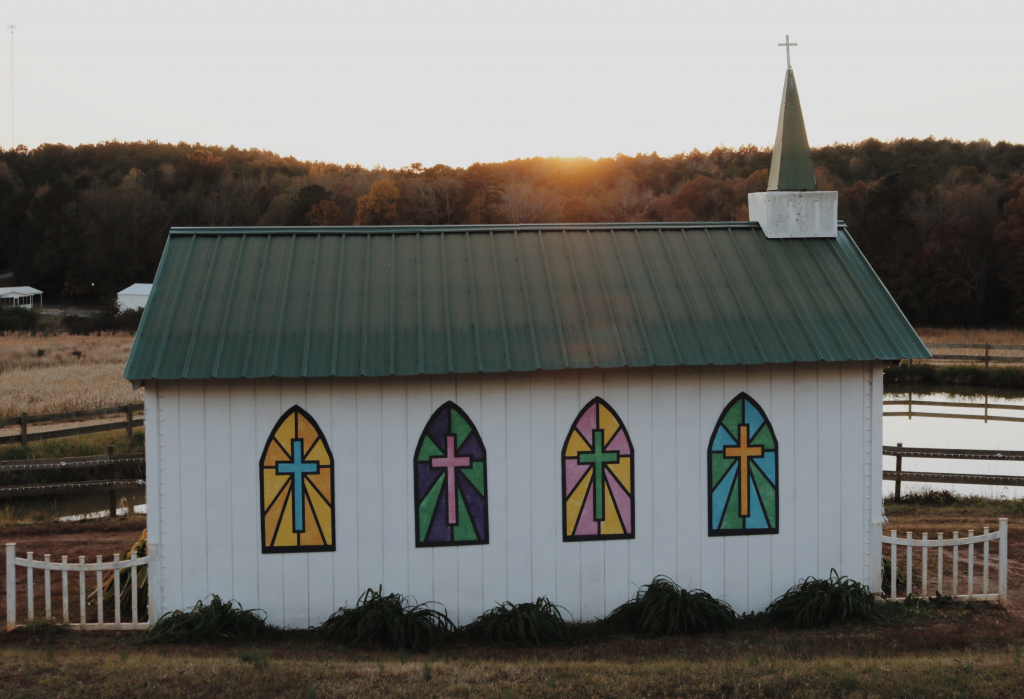How to Choose A Church?


There may be many reasons you’re looking for a church. Perhaps you’ve just believed the good news of Jesus Christ and are seeking to be obedient to Him by committing to a local church. Perhaps you are a Christian that is unsatisfied with your current church and are on the lookout for a new one. Perhaps you need to relocate and find a new church in your new area. What must we consider as we choose a church? What kind of church should we join? To answer these questions, we need to turn to the Scriptures and see what church is and what it is for.
1. The Church: The Final Gathering of God’s people in Heaven
The bible ends with a glorious picture of an eternal gathering of God’s people before the throne of God and the Jesus the Lamb (Rev. 21-22). In the new creation, the fall is reversed, along with all its effects (Rev. 22:3). There is no more death, nor mourning, nor crying, nor pain (Rev. 21:4). Most importantly, there is no more separation from God. His people serving him night and day before his throne, being sheltered by His presence, enjoying life with Him forever (Rev. 7:15-17). This is the essence of what church is, God’s people redeemed by the blood of Jesus Christ, gathered around God in the new creation.
The word ‘church’ is translated from the Greek word ekklēsia, which means assembly, gathering or congregation. The New Testament authors use this word to refer to the final, universal church described in Revelation 7:9-17 (c.f. Matt. 16:18, Eph. 1:22, Heb. 12:23), and also the local gathering of Christians on earth (cf. Matt. 18:17, Acts 5:11, Gal. 1:2). In fact, local gatherings of Christians are physical, earthly manifestations of the eternal gathering in the heavenly throne room. In Acts 20:28, Paul addresses the elders of the Ephesian church. As overseers they are to “care for the church of God which he obtained with his own blood”. In 1 Cor. 1:2 and 2 Cor. 1:1, the local assembly is called ‘the church of God that is at Corinth’. While we are not yet physically gathered before Jesus on the final day, we who have been redeemed by the blood of Jesus are already gathered spiritually in Christ around his heavenly throne.
2. The church: The Gathering of God’s People on Earth
Since Christians are members of that eternal gathering, they are encouraged to gather on earth. We gather to encourage each other and spur one another on to love and good works as we wait for Christ’s return. Hebrews 10:24-25 encourages us to keep meeting up as Christians:
And let us consider how to stir up one another to love and good works, not neglecting to meet together, as is the habit of some, but encouraging one another, and all the more as you see the Day drawing near.
~ Hebrews 10:24-25, ESV
How then should we gather as Christians on earth today? What should we be doing as a church to encourage one another effectively? Ephesians 4 gives us a clear picture of how a biblical gathering of Christians should look like.
And he gave the apostles, the prophets, the evangelists, the shepherds and teachers, to equip the saints for the work of ministry, for building up the body of Christ, until we all attain to the unity of the faith and of the knowledge of the Son of God, to mature manhood, to the measure of the stature of the fullness of Christ, so that we may no longer be children, tossed to and fro by the waves and carried about by every wind of doctrine, by human cunning, by craftiness in deceitful schemes. Rather, speaking the truth in love, we are to grow up in every way into him who is the head, into Christ, from whom the whole body, joined and held together by every joint with which it is equipped, when each part is working properly, makes the body grow so that it builds itself up in love.
~ Ephesians 4:11-16, ESV
a. Jesus gave word teachers to the church

Jesus has not left the church behind helpless. Rather, he has given the church word-ministers to teach God’s word. He gave the apostles and the prophets, who record God’s word to us in the form of narratives, letters, prophecies, historical accounts on the pages of Scripture. The whole bible points to the Lord Jesus, in whom we find fulfilment of all God’s promises (2 Cor. 1:20).
Jesus also gave his church evangelists, shepherds and teachers to teach and explain the Scriptures. Churches gather around Christ spiritually to be addressed by him as God’s word is read and considered together. Pastors and teachers are God’s good gift to his church, that his people can continue to live under the loving rule of Jesus Christ. Note that the authority does not lie in these individuals, but in the word of God, when it is faithfully proclaimed and taught.
b. to equip the saints for work of ministry
Perhaps surprising to many, the work of ministry does not exclusively belong to word teachers, but to the saints (which is all God’s people!). The role of word ministers is to teach the saints the word of God, so that they are equipped to engage in ministry themselves. The goal of this ministry is to “build up the body of Christ” (Eph. 4:12). When each part of the body is working properly, the body grows and builds itself up in love (Eph. 4:16). All these remarkable descriptions of spiritual health and maturity can be achieved by the ministry of the saints – “speaking the truth in love” to one another (Eph. 4:15).
The phrase “speaking the truth in love” (Eph. 4:15) is more literally “truthing in love”. This suggests a much wider application of how we ought to encourage one another with the truth. As we learn from God’s word through word ministers, we all have a role to play in speaking, reflecting, applying, singing, and living out the same truths to one another. As we remind each other of these gospel truths, the whole church will be built up and grow in maturity and godliness.
Paul rightly reminds us that we ought to speak the truth in love. This love is to imitate the love of Christ himself who ‘gave himself up for us, a fragrant offering and sacrifice to God”, bearing our sin and judgement so that we might become God’s holy people (Eph 5:2). We ought to speak the truth to one another, not for the sake of passing judgement or to establish spiritual superiority over others, but with the goal of building them up in Christ, whatever it takes.
c. The outcome
As the church perseveres in listening to the truth and communicating it to one another, the bible promises true growth in maturity and Christ-likeness. True growth is described by Paul as “”unity of the faith and of the knowledge of the Son of God” (Eph. 4:13). With this definition of growth in mind, it makes sense why understanding and internalizing gospel truth matters. As the body of Christ, we can be moulded and shaped by God’s word and be made more and more like Christ, as we long for the day when we will be perfected in Him.
On the other hand, Paul explains why this is so important. There are so many alternatives to the gospel that distracts us from setting our eyes on Christ. If we are not well equipped by God’s word and growing in spiritual maturity, there is a danger of being deceived by the world and by false teachers. We will remain spiritual children, tossed to and fro by the lies and schemes of this world (Eph. 4:14). The earthly gatherings of Christians are indeed God’s gifts to us, to preserve us in the truth and to grow us in our faith, keeping us firm in faith to the end.
3. Implications
Having considered what church is, and what it is for, we are ready to address some common questions related to choosing a church.
a. Must I commit myself to a local church?
As we have seen, our membership in the final heavenly gathering should express itself in a commitment to a local earthly gathering of God’s people today. Gathering as God’s church is such a crucial aspect of our identity as God’s new creation people. It is through being part of a local church that we begin to enjoy the new creation life — the privilege to live under God’s word, and to love and serve each other.
Besides, there is a real danger of falling away from Christ if we do not commit to gathering regularly with a community that speaks the truth in love to one another (Eph 4:14). As fellow believers, we must remind each other of our new identity as God’s people. Church is one of God’s means of grace to keep us in our faith until the end. Therefore, it is essential that we commit ourselves to a local church whenever possible. This is not merely a religious duty, but God’s good design for us to begin living out our new identity in Christ as we anticipate heaven itself. How exciting is that?
b. How do I choose a church?
In Ephesians 4, we have seen how the word of God ought to be the centre of the church gathering, driving the growth of the church. It is the word of God that continuously reminds us of our spiritual identity. It is the word of God that gives us motivation to love and serve each other. Therefore, when you are choosing a church, try to evaluate if the Bible is at the centre of the ministries of the church. Is the preaching from the pulpit faithful to the Bible, or are passages being constantly misinterpreted out of context? Are there small group bible studies that will help the members dwell deeper into God’s word? Or is the Bible referred to, but not really central to the life of the church?
We’ve also seen how important it is to speak the truth in love to one another. As the truths of the bible are preached to the church, do the current members encourage each other with these truths in word and in action? If yes, has it been done properly in love? Is there an avenue for you to do the same effectively?
Finally, it is important for us to remember that church is fundamentally a gathering of people. God is using the church to grow people into the likeness of His Son and to keep us faithful till the end. As theologically sound and biblically solid a church can be, it is futile if it is not people-focused. Find a church that cares about the growth and spiritual wellbeing of its individual members. Ministries such as one-to-one bible studies and personal follow-ups are positive signs of a church heading in this direction.
While many of these things may look different depending on the context, the general principles will be helpful regardless of your exact situation.
c. What should I do if my church seems deficient or lacking?
It is vital to acknowledge that there is no perfect church on earth. We still live in a fallen world stained by sin. While, Christians are indwelt by God’s Spirit, they are still constantly battling with their fleshly bodies. Having said that, a church is a people redeemed by the gospel, gathered around the gospel, who are continually being transformed by the gospel. In my opinion, a church is worth staying if the DNA of a church – the gospel – is still present and actively at work. It is also helpful to remember that you are not just an attendee of the church, but you are a member of the church. Before you think about leaving your church for any reason, why not ask yourself these questions first: what can I do to help build up this church? How can I love these people better? How can I help this church to be what it should be?
However, as painful as it may be, there may be situations where leaving a church might be the only right decision. A church is no longer God’s church when the gospel is absent, and the Scriptures are not being faithfully taught. Leave the church if there are false teachings that distort and deny the gospel. In any case, it is important to be praying to God for wisdom in decision making, and for patience and genuine love in treating others throughout the process. If you are unsure, it is always wise to consult other mature Christian for their advice in your specific situation.
4. Concluding remarks
As Christians, the church is both our present reality and our future hope. As people who belong to God’s kingdom, we are called to gather as fellow believers, awaiting the coming of our King Jesus. Many of God’s wonderful promises and blessings are only realized when we commit ourselves to a local church, however imperfect it may be. Therefore, let us strive to love the imperfect church as Christ loved her and gave himself up for her, and let us look forward to the glorious heavenly assembly, where God’s people can finally see him face to face, and where sin and death are no more.
If you are currently looking for a church to commit to in Malaysia, do consider visiting the church finder page on this website (https://malaysiagospel.org/church-finder/), where you can find a list of recommended churches in most major cities in Malaysia.
Get articles delivered straight to your inbox. Sign up for our mailing list here.
Follow us on:

Lee Zheng Yang is a member of St. Mary's Cathedral, Kuala Lumpur. He came back to Malaysia in 2019 after finishing his Engineering degree in London, and is currently working as a software engineer. Being a Sarawakian, he is proud to say that Sarawak has the best laksa.
Related Articles
The Extension of Eden: From Promised Land to New Creation

The question of the promises regarding the land of Israel has always been a vexed one, arising afresh in the modern day conflict between Israel & Palestine. How does biblical theology help us in thinking rightly about the Promised Land? In this, article, we consider the Bible's teaching from Genesis to Revelation and it's implications for how we think about the Promised Land today.
Reintegrating the Atonement in Missions

if Jesus can give healing and power because of who he is, why did he need to die on the cross? How should we proclaim the gospel in a culture dominated by fear and power? More specifically, how should we explain the atonement? In an era that has emphasised contextualisation, these are key questions that Christians need to be clear on as they seek to to share the gospel cross-culturally.
Pastors, Are We Burdening Our Church Members? (Part 2)

Too often we hear of Christians attending church being burnt out, tired, and needing a break. Many times, such people are not in leadership positions. They just feel burnt out from the demands of church: Sunday Service, Sunday School, Bible Study, Prayer Meetings, and another ministry meeting each week. On top of all these demands from church, there are family responsibilities, work deadlines and maybe some leftover time for friends. The church, whether explicitly or implicitly...
